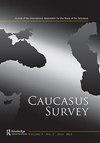阿塞拜疆与外高加索民主联邦共和国:历史现实与可能性*
IF 0.4
Q3 AREA STUDIES
引用次数: 0
摘要
摘要本文从阿塞拜疆政治家的角度探讨了1918年独立的外高加索民主联邦共和国(TDFR)的成立和迅速解体的起源、谈判和考虑。在迅速变化的地缘政治局势中,除了寻求奥斯曼土耳其的支持外,几乎没有其他选择来实现他们的目标并确保他们的利益——主要是阿塞拜疆穆斯林人口的经济和人身安全,以及巴库从布尔什维克的控制下恢复——,外高加索议会中的阿塞拜疆派系仍然主张联邦原则,反对土耳其关于巴统地位的意图,不支持将其国家并入奥斯曼帝国。为了正确评估阿塞拜疆人在创建短暂的TDFR中的作用,有必要研究外高加索历史的基本面,从1917年布尔什维克十月政变到1918年4月22日创建TDFR并于1918年5月26日至28日解散为独立国家。本文章由计算机程序翻译,如有差异,请以英文原文为准。
Azerbaijan and the Transcaucasian Democratic Federative Republic: historical reality and possibility*
ABSTRACT This article examines the origins, negotiations and considerations surrounding the formation and then rapid dissolution of the independent Transcaucasian Democratic Federative Republic (TDFR) in 1918 from the perspective of Azerbaijani statesmen. Left with few alternatives in the rapidly changing geopolitical situation to accomplish their goals and assure their interests – primarily the economic and physical security of the Azerbaijani Muslim population, and also the recovery of Baku from Bolshevik control – other than to seek the backing of Ottoman Turkey, the Azerbaijani faction in the Transcaucasian Seim nevertheless advocated for the principle of federation, stood up against Turkish intentions regarding the status of Batumi, and did not support the incorporation of their country into the Ottoman Empire. In order to properly evaluate the role of the Azerbaijanis in the creation of the ephemeral TDFR, it is essential to examine the fundamentals of the history of Transcaucasia from the Bolshevik October coup in 1917 until the creation of the TDFR on 22 April 1918 and its dissolution into independent states on 26–28 May 1918.
求助全文
通过发布文献求助,成功后即可免费获取论文全文。
去求助
来源期刊

Caucasus Survey
Arts and Humanities-History
CiteScore
1.30
自引率
9.10%
发文量
4
期刊介绍:
Caucasus Survey is a new peer-reviewed, multidisciplinary and independent journal, concerned with the study of the Caucasus – the independent republics of Armenia, Azerbaijan and Georgia, de facto entities in the area and the North Caucasian republics and regions of the Russian Federation. Also covered are issues relating to the Republic of Kalmykia, Crimea, the Cossacks, Nogays, and Caucasian diasporas. Caucasus Survey aims to advance an area studies tradition in the humanities and social sciences about and from the Caucasus, connecting this tradition with core disciplinary concerns in the fields of history, political science, sociology, anthropology, cultural and religious studies, economics, political geography and demography, security, war and peace studies, and social psychology. Research enhancing understanding of the region’s conflicts and relations between the Russian Federation and the Caucasus, internationally and domestically with regard to the North Caucasus, features high in our concerns.
 求助内容:
求助内容: 应助结果提醒方式:
应助结果提醒方式:


